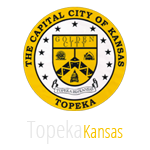
The Topeka Police Department is proud to announce a new collaborative state-of-the-art initiative to help the unsheltered and indigent population in Topeka.
TPD has started issuing official City of Topeka Personal Identification Cards, an initiative that has never been done in Kansas. The cards are meant to bridge the gap for the unsheltered or those who otherwise wouldn’t be able to afford or have the proper documentation to apply for a state issued ID. The city issued ID cards are free and available to anyone in need.
The City of Topeka issued ID card will include the person’s legal name, photo, signature, date of birth, personal demographics, address or last know location, and Kansas State ID card number if applicable. In order to qualify, individuals must go through the Topeka Police Department for this process.
The City of Topeka issued IDs can be used to apply for a job through Day Labor Services, apply for residency and more.
“We are very excited to have partnered on this progressive effort to aid the unsheltered population in Topeka. These ID cards will allow people to gain access to a wide range of services that otherwise would not be available to them,” said Chief Bill Cochran. “Proper identification is a crucial element on the path towards gaining self-sustainability for this section of our population. We are here to help them along the way.”
In Kansas, to apply for a state issued identification card, you must have proof of identification. Many unsheltered people don’t have proof of identification, making the process nearly impossible.
In partnership with the Kansas Department of Revenue and Kansas Department of Health and Environment: Office of Vital Statistics, the Topeka Police Department is streamlining this normally difficult process. KDOR will be accepting the city issued ID card as proof of identification, which will then allow a person to get a temporary one-year state issued ID card. With that temporary state issued ID, the person has one year to go to Vital Statistics to get a copy of their birth certificate. With the temporary state ID card and the official copy of their birth certificate, they are then able to go to Social Security to get a copy of their social security card. After this process is complete, they can then go back to KDOR to get their official state ID. There will be a cost associated with applying for the temporary state ID card and official state ID card.
The identification process for the City of Topeka issued ID card will be in depth, to make sure that the person is identified correctly. This process will take anywhere between a week to a month.
The Topeka Rescue Mission will be assisting in our unsheltered and indigent outreach efforts as we work to identify those who can benefit from this initiative.
“One of the greatest barriers to success for unsheltered individuals is the inability to obtain legal identification. Without this identification, unsheltered individuals and families are unable to obtain employment, open a bank account, attend many educational opportunities and often move into safe and affordable housing. All too often they have nowhere else to turn other than the shelters of the Topeka Rescue Mission or the streets,” said Barry Feaker, Topeka Rescue Mission Executive Director. “Once again, the Topeka Police Department, under the leadership of Chief Bill Cochran and dedicated Officers like Sgt. Josh Klamm who has spearheaded this initiative, have created an innovative way to serve those most in need. I believe this new initiative may prove to be one of the greatest tools to breaking the cycle for unsheltered individuals that we have discovered thus far and undoubtedly will be replicated in other communities. It’s an honor to work alongside the men and women of TPD as they continually look for ways to protect and serve all of our citizens.”
It is important for people to understand that the city issued ID cards are free, but will not come with the same rights as a state issued ID card, driver’s license or passport, which will come at a cost.
Anyone interested in getting a City of Topeka Identification Card can email Sgt. Mathew Rose at mrose@topeka.org. You can also come down to the Law Enforcement Center located at 320 S Kansas Ave. Suite 100 and speak with an officer at the front desk for assistance.



